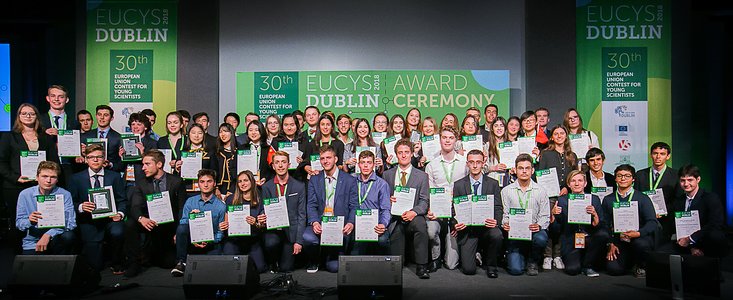Annuncio
Annunciati i vincitori della gara dell'Unione Europea per Giovani Scienziati - edizione 2018
27 Settembre 2018
Sono stati annunciati i vincitori dell'edizione del 2018 del prestigioso concorso dell'Unione Europea per giovani scienziati (EUCYS da European Union Contest for Young Scientists). Dal 1989 l'EUCYS promuove la cooperazione e lo scambio tra giovani scienziati con lo scopo di indirizzare le loro future carriere nel campo della scienza e della tecnologia. Quest'anno, 135 giovani scienziati provenienti da 38 paesi e le scuole europee si sono riuniti a Dublino, in Irlanda, per partecipare al concorso. Il concorso è stato giudicato dalla Giuria EUCYS 2018, che comprendeva 19 esperti di una vasta gamma di esperienze scientifiche.
I primi tre premi del concorso EUCYS 2018 sono stati consegnati da Mary Mitchell O'Connor, Ministro irlandese dell'Istruzione superiore, e da Wolfgang Burtscher, direttore generale aggiunto per la ricerca e l'innovazione della Commissione europea. I premi erano ciascuno di € 7 000 e sono stati assegnati a Adrian Fleck (20) e Anna Amelie Fleck (16) per "FleckProtec - Body Protection Made From Starch"; Nicolas Fedrigo (17) per "Migliorare le fusioni spinali: ridisegnare la sonda peduncolare per prevenire le rotture vertebrali"; e Brendon Matusch (15) per il progetto intitolato "Sviluppo di un veicolo autonomo di livello 2 che utilizza reti neurali convolutive e apprendimento di rinforzo".
I premi di secondo livello da € 5 000 sono stati assegnati a Alexandru Liviu Bratosin (17 anni), Petru Molla (17 anni) e Mihnea Vlad Bojian (18 anni) per "DNAdrive"; Karl Hendrik Tamkivi (18) per "Posizionamento di incubatrici per pipistrelli in relazione al complesso paesaggistico circostante in Western Saaremaa"; e Francisco Miguel Araújo (17) per "Teoremi commutativi per gruppi e semigruppi".
I premi del terzo posto, da € 3 500 ciascuno, sono stati assegnati a Marina Gudzhabidze (18), Dea Ilarionova (17) e Shorena Gudzhabidze (17) per il progetto intitolato "Rivelatore a mano con schermi a mosaico retroriflettente per visualizzare le disomogeneità ottiche"; Kyuhee Jo (18) e Chaeyoung Lee (18) per "Costruire un modello di classificazione robusto per la diagnosi basata sul linguaggio della malattia di Parkinson"; e a Sijia Zhang (18) per il loro progetto intitolato "Indagine sul problema dei conflitti verbali nelle famiglie degli studenti delle scuole medie".
Come membro dell'EIROforum - un gruppo di otto importanti organizzazioni intergovernative europee di ricerca - l'ESO ha donato un premio speciale per il miglior progetto nel campo dell'astronomia e della fisica dello spazio, che è stato consegnato dal Senior Advisor di EUROfusion, Duarte Borba. Il premio è stato vinto dal diciannovenne svizzero Sébastien Christophe Garmier per il suo progetto intitolato "cuRRay: ricostruzione delle traiettorie in ambiente CUDA per raggi di luce nello spaziotempo relativistico di Kerr-Newman". La vincita consiste in un viaggio ai siti dell'ESO in Cile, tra cui l'Osservatorio del Paranal, e alle strutture dell'ESO a Santiago, offrendo a Garmier una visione unica della vita presso gli osservatori più avanzati del mondo.
Links
Riguardo all'annuncio
| Identificazione: | ann18067 |


